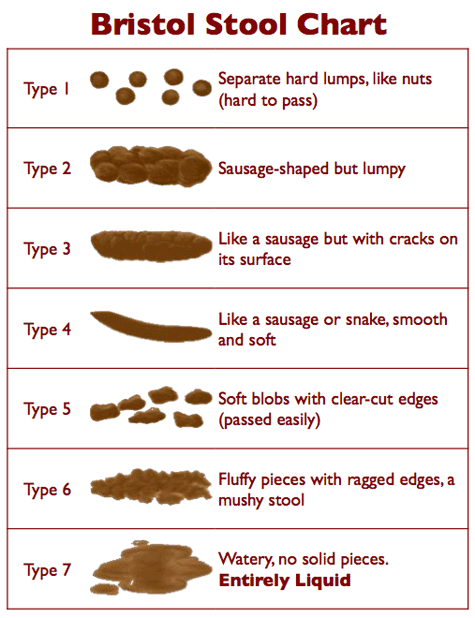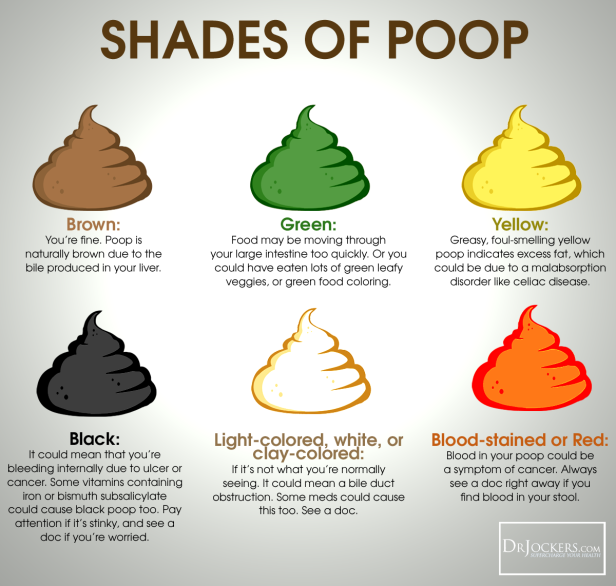When it comes to our physiological needs, not many of us are willing to discuss openly on the subject. Sure, we might make a joke or two, but it will never come to actually admitting something about our bathroom habits. Well, this is indeed an important area of health and one that can provide information about our bodies and how well they function. Does your poop float or sink? While this question might seem silly, its answer can determine whether you have a good digestion or not. Let us find out more information on the subject.
First of all, what is a ‘normal’ stool shape/consistency? According to the Bristol stool chart that is used in many hospitals, it is type 4 as shown in the picture below:

What does it mean if your poop floats?
In simple terms, if your poop floats, this means that you are not digesting fats properly. You should also be on the lookout for other signs, such as the stool that sticks to the toilet bowl or the one that is difficult to flush. Also, if the water in the toilet bowl becomes oily, this can also indicate the poor digestion of fats. Often times, this means that you have a problem at the level of your gallbladder, pancreas or liver.
Stools that are too hard
If you are making bricks rather than clay sculptures, it is often the sign that you are eating too little fiber. When you eat adequate amounts of fiber, you are stimulating the presence of healthy bacteria in the gastrointestinal tract; these in turn produce gases, which are responsible for softer poop. What you want to do is include more foods that are rich in fiber in your diet, including fruits, vegetables, nuts and legumes.
Other things to be on the lookout for
It is possible that the floating poop is a sign of Celiac disease. However, in this case you would also have other symptoms present, such as: modified color of the stool (grey, tan etc.), foul odor, loose stools. You can get tested for this condition and/or try to eliminate gluten from your diet.
Constipation can often lead to hard poop, especially if it has transformed into a chronic condition. In this situation, you should work on the causes of constipation; for example, you can drink more water, improve the quality of your diet and take magnesium supplements, as these can relax the intestines.
Poop checklist
Apart from the buoyancy of your stool, these are aspects you should take into consideration:
- One stool per day (max. 3)
- Stool should be smooth and banana-shaped
- Stools should not be excessively hard or smooth (constipation or diarrhea)
- Stool of medium-brown color (not tan, grey or other colors)
- Blood, mucus, fat or food should not be present in the stool
- No foul odor present.
Specialists confirm the importance of regular bowel movements
According to a report by Richard Collins, MD on the subject of healthy bowels, the health of the colon is guaranteed when one has regular bowel movements. Dr. Collins discusses about floaters, which can be a sign of excess gas, a diet rich in fermenting foods (cabbage, beans, sprouts etc.) or poor fat absorption (oil slick appearance). Constipation is also presented as a cause of excessively hard stools, the main cause being the lack of fiber.
What about stool color?
The infographic below by Dr. Jockers is a handy ‘cheat sheet’ of what different stool colors MAY mean. You should always speak to a doctor if you notice sudden stool changes.

Final word
No matter how much a taboo subject this might be, it is a good thing to check your stool and try to determine how healthy it is. If you have noticed any changes in your stool, and blood in particular, it is recommended to visit a doctor as soon as it is possible. The doctor can properly diagnose the underlying condition that has led to such symptoms in the first place, recommending a proper treatment plan.
References:



Very useful info of health 😉
LikeLike
I would have appreciated an interpretation of the Bristol Stool chart. Like what does it mean if your stool is a type 1 or type 2 , etc. Also, what does mucus or blood in the stool look like? Is fuzzy/hairy looking stool mucus?? AND, are you saying poop should NOT have a foul smell? I mean, some are worse than others but I have NEVER not smelled poop. All poop smells and it not a good smell.
LikeLike
Most helpful info I have ever heard regarding this delicate subject, so many thanks!
LikeLike